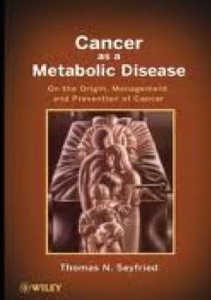- Is Cancer Caused By Genetics? Or Metabolism?
- Can You Cure Cancer With Diet? A Boston College Researcher Thinks So
- What Is The Ketogenic Diet Good For?
Full Interview Audio
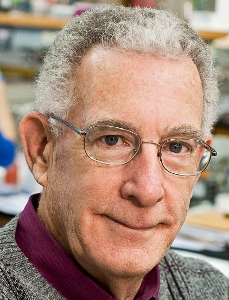
Personal Info
Hobbies and Interests:Bass Fishing, Reading about energy metabolism
Sports Teams:Boston College basketball and football, Boston Celtics, Patriots, all Boston sports teams
Favourite Books:
- The Origin of Species by Charles Darwin
Most Influenced By: Herman Brockman, Bill Daniel, Robert Yu
Facebook: http://facebook.com/CancerIsAMetabolicDisease
Company Website: http://http://www.bc.edu/schools/cas/biology/facadmin/seyfried/
Interview Highlights
This is a condensed, lightly edited transcript of an audio interview. The full audio is available and highly recommended. The interviewee may post clarifications in the comments.
Adrian Bye: Today I’m here with Professor Thomas Seyfried who is a cancer researcher at Boston College in Boston. Professor Seyfried, thanks for joining us.
Thomas Seyfried: Thank you very much, Adrian, It’s a pleasure to be here.
Adrian Bye: Can you tell us a little bit about your background and what you did to become who you are?
Thomas Seyfried: We’ve been in this business for quite a while, but my main background is in genetics. I received a degree in genetics and lipid biochemistry from the University of Illinois. Then we proceeded to do considerable work on neurochemistry in the brain in animals with epilepsy and mapping genes in very complex epilepsies. We were also at the same time doing studies of brain tumors while I was at Yale University. Over the years we were doing basic fundamental research and then we started to do some drug studies on brain tumors. It became apparent to us that the therapeutic benefits of some of the drugs were linked to actual body weight loss. So the effects that we saw on certain drugs were linked more to how much body weight the animal lost when they were taking the drug. When we included body weight controls we basically found the same thing: the size of the tumors were reduced to approximately the same level. And then we began to look at the biochemistry of the tumors and found the body weight loss was associated with the restriction of blood vessels, which is an anti-angiogenic effect.
Adrian Bye: I gonna have to simplify this down a little bit. Dr Seyfried is a researcher who is focused on ketogenic diet with relation to cancer. You’re building on research from Otto Warburg and others, basically saying that you can essentially stop cancer by switching cancer patients to a ketogenic diet. So when you’re talking about loss of body weight, that’s essentially what you’re talking about. Does that sound correct?
Thomas Seyfried: The ketogenic diet was designed originally as a means of controlling very difficult refractory seizures in children. The mechanism by which this ketogenic diet blocks epilepsy is still a point of considerable discussion and research. This research started in the 1920s by Dr Wilder, when he was looking at fasting and showing how powerful fasting was in blocking seizures. But that’s only a temporary effect. Then they developed this ketogenic diet. What we did was to dovetail this ketogenic diet into the management of cancer, mainly because we found that these body weight losses were associated with reduced glucose and elevated ketones. And if you want to reduce glucose and elevate ketones, the ketogenic diet is the best way to do this. It became clear that we could have a significant impact on how tumors grow and look at also the multiple different mechanisms that the cancer industry is investigating through various drugs, immunotherapies and all these kind of things, and find out that the ketogenic diet does all this, but without toxicity. That now becomes very interesting, you manage the disease without toxicity.
Adrian Bye: Is this something you came up with or is this something from Otto Warburg? Or where did this come from?
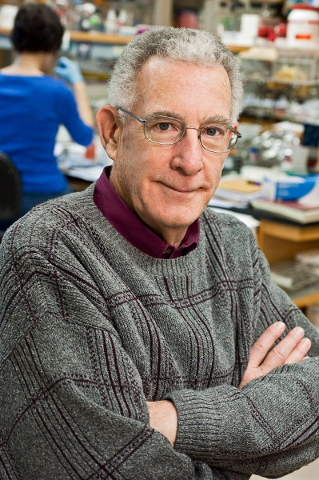
Thomas Seyfried: The ketogenic diet came from studies with epilepsy, but Warburg showed that it was the blood glucose that was driving tumors. His theory is that the reason why the tumors are so dependent on glucose for their growth and survival is because their mitochondria, the little energy producing organelle within the cell, are defective. The cells can’t respire effectively because the organelle responsible for respiration is abnormal, insufficient, or damaged. If this happens, the cell in order to survive must revert to a primitive form of energy, which is fermentation. And the primary fuel for fermentation is glucose. The ketogenic diet lowers the glucose and then has the body burn ketones. If the cancer cells have defective respiration because their mitochondria are defective, they can’t effectively burn the ketones. So we have a very nice, elegant system to target and kill tumor cells without toxicity, which is based on Otto Warburg’s theory. People can argue whether he was right or not, but his theory, the basic concept that respiration is abnormal with compensatory fermentation, which is referred to as the Warburg effect, still stands. And it is becoming more and more investigated now that people realize we’re not making major progress in the genomic analysis or in using genomic information to target diseases. It’s simply not effective. Now people are revisiting the Warburg theory and recognizing that he actually had this thing pegged a long time ago.
Adrian Bye: Are a lot of people researching this?
Thomas Seyfried: I wouldn’t say a lot, but it’s an emerging field. The studies of cancer energy metabolism are advancing significantly. New journals are starting and many people are now becoming more aware of it. Although I have to admit, mainstream academic cancer research is still focused on the gene theory of cancer and many therapies that are being developed are being linked to the idea that cancer is a genetic disease. So, if metabolism is considered it would be considered as an effect of some kind of gene mutation. And we’ve shown that that’s not the case.
There are alternatives to toxic radiation. But there is a reluctance to get clinical trials going to prove our case without having to first radiate the person. The standard of care requires radiation, but radiation itself is tremendously damaging and can also provoke the tumor. The trials that are being considered today for the most part are that we give the patient the standard of care, which is radiation and chemo. Then, when the tumor recurs and invariably it does, we will use this ketogenic diet. At that point people are open to the ketogenic diet because they no longer have anything that will work. The problem is now you’re asking this metabolic therapy to attempt to correct the incredible damage done by the original standard of care while at the same time curing the tumor. That is a tall order for any kind of therapy. Let’s be honest, most of the drugs that people are subjected to are extremely toxic and that’s one of the reasons why people fear the cancer, mainly because of the kinds of treatments their bodies have to be subjected to.
Adrian Bye: My father refused most chemo. He took a little bit at the end. He was an orthopedic surgeon and he knew exactly what all of those things do. I think doctors know this but patients don’t.
Thomas Seyfried: That’s true. I certainly know of some physicians who are actually doing the ketogenic diet themselves to try to battle their own disease. And that’s another thing, too. When you say I’m using metabolic therapy and the ketogenic diet to battle my cancer, that’s a true statement. Many people say, he is battling his cancer, which is really not doing anything but sitting there and getting infused with some sort of toxic chemical or radiated. I don’t consider that battling your disease. But using metabolic therapy definitely is because a lot of it comes as a personal determination to do this. Once your body is in this new state where glucose is lower and ketones are elevated, these tumor cells now become vulnerable to so many other kinds of approaches. And some of these new therapies from the genome projects could potentially be very useful in finishing off surviving tumor cells in some of these patients. The problem now is they’re using some of these new therapies as a stand-alone or first line of attack. The tumor is so genetically heterogeneous this approach doesn’t work, except you might live another few months at an enormous cost. In our writings we say that these things could be effective as the final chapter in controlling your disease because now you have a much smaller tumor with a very few number of cells that may all express the same marker. Now these surviving tumor cells become very vulnerable to these personalized genetic therapies. But the personalized genetic therapies don’t work well as an up-front first line of attack on the majority of people that are treated. I think we need to re-evaluate how we treat the disease and the timing and how we apply this to the patients. This is lacking in the cancer field today.
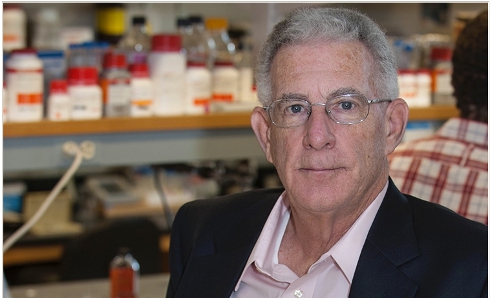
Adrian Bye: Have the incidents of cancer increased over the last fifty years?
Thomas Seyfried: The number of new cases is certainly increasing every year, there is no question about it. I’ve even linked the percentage increase of new cases each year to the percentage of increase in cancer research funding. The percentage increase in funding parallels the percentage increase in new cancer cases. What is interesting though is the number of deaths per year, or deaths per day, hasn’t really changed much in more than twenty years. There are more people being diagnosed with cancer, there are more people being treated with cancer, and many of these treatments themselves will lead to secondary cancers later on in life and other adverse effects. In fact, there are new clinics opening up now just to deal with the millions of so-called cancer survivors who are now suffering from all kinds of maladies that they never had before they had cancer. Depression is very high in survivors; and there are also gastrointestinal issues, neurological issues, bone issues, cardiovascular disease. You don’t get out of this completely unscathed. And ten to twenty years after the treatments there are recurring cancers that could occur in the same tissue or in a different tissue.
Adrian Bye: Do you not feel that it’s actually very possible that one of the fundamental causes of all this cancer may actually be the amount of carbs that we are eating?
Thomas Seyfried: This is another topic that I’ve written about in my book, cancer prevention. People can go on a sustained ketogenic diet day in and day out, and some people that I know are using a very Paleolithic diet. This Paleolithic diet is very healthy. These are good conscious choices for maximum health benefits. Or people who say, I can’t be doing this my whole life, for those kinds of people doing a periodic fast for three to four days a couple of times a year can be very healthy in rejuvenating mitochondrial function. As long as you can keep the mitochondria healthy, the probability of getting cancer is extremely low. If you are on a ketogenic diet the probability of getting cancer while on the diet is much lower than if you’re not on the diet. If you want to try to help yourself for a short period of time you can do a water-only therapeutic fast a couple of times a year. This will enhance the functionality of the mitochondria and significantly reduce the risk of cancer. So, people have these choices. There is not just one way to prevent cancer, there are many ways. Diet and exercise are critical.
Adrian Bye: But couldn’t we just suggest that given the fact that the ketogenic diet, which is essentially a high fat diet, is so successful in treating cancer, eating too much carbs is the cause of a lot of this cancer?
Thomas Seyfried: We have introduced a lot of high-fructose corn syrup, a lot of carbohydrate sugars in all of our foods. There is no question that this is having an impact. There are significant linkages between hemoglobin A1, which is a marker for elevated glucose, and the risk of certain kinds of cancers, diabetes and Alzheimer’s disease. Interestingly enough, Alzheimer’s disease is a very interesting point because apparently, if you have Alzheimer’s disease, the risk of cancer is much less. We grappled with this concept for quite some time. What is it about if you have Alzheimer’s disease your risk of cancer is much lower? What we found is that people who have Alzheimer’s are actually hypometabolic. They have fewer glucose transporters on their cells. And if glucose is driving your cancer and you can’t bring the glucose into the cell for whatever reason, you are not able to develop a cancer very effectively. Cancer is one kind of metabolic disorder and Alzheimer’s disease is another kind, but they seem to be potentially on the opposite poles. Again, can you treat Alzheimer’s disease with a ketogenic diet? The answer is yes. It works by stimulating mitochondria in some of these cells of the Alzheimer’s patients, whereas in cancer the tumor cells can’t use the ketones so they become metabolically marginalized. So we have to think of the different kinds of mechanisms by which these same therapies work against one disease versus another. We do know that the ketogenic diet can improve the cognitive behavior of certain people with Alzheimer’s disease. Clearly there is a link although it’s not widely accepted. I think people want drugs that will cure or delay Alzheimer’s. Unfortunately, many of the drugs for Alzheimer’s disease are toxic, like many of the drugs for cancer.
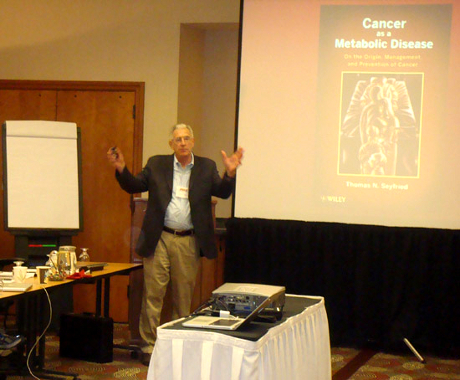
We came from a Paleolithic ancestry where these kinds of carbs were not in the system. Now we’ve infused all these carbohydrates into the foods to make almost everything with sugar. People have to realize that a balance is needed. I think the key thing is we are getting away from the key balance and that disturbance of the balance is in some way contributing to the higher risk of not only cancer but Alzheimer’s disease, Parkinson’s disease, cardiovascular disease, type 2 diabetes, you can go on. Putting the carbs into the foods has created a situation that is unhealthy. Now we have an industry that develops around producing drugs rather than going to the source and saying let’s re-evaluate the diets. No, we make a whole series of drugs that are going to individually treat all these different diseases, which potentially have a common origin with an imbalance in the amount of carbs in the food. All this information needs to come out. People need to be more aware of this information so that they can make their own decisions.
Adrian Bye: Very good. Is there anything else that you would like to tell us?
Thomas Seyfried: We covered a lot of interesting areas. I think people can get an idea of what we’re doing here, our approach to this very difficult problem. I’ve written a number of papers; we’ve just had another major paper accepted for those who might be interested in learning more about the mechanisms involved in the approach that we’re taking. I’m hopeful for the future of cancer. I think this is a disease that can be managed effectively without toxicity and possibly at a much lower cost than is presently experienced. So I’m optimistic in that regard.
Adrian Bye: Awesome. Professor Seyfried, thank you very much for the interview.



